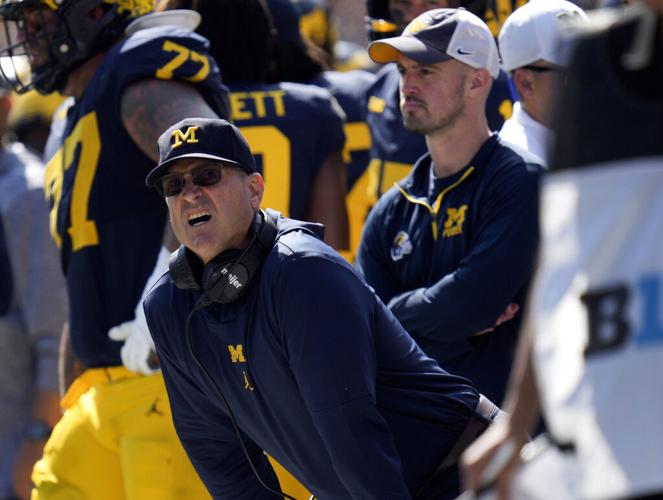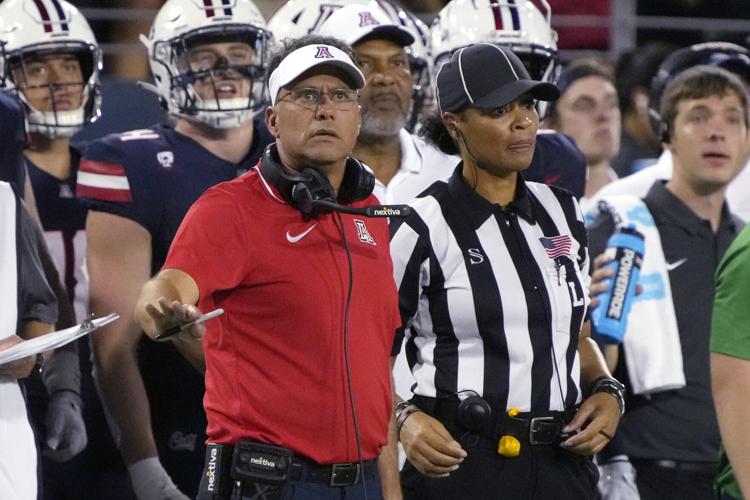Jedd Fisch had a rapport with Connor Stalions, the Michigan football analyst who is at the center of an investigation into the program for sign-stealing, but was never his employer at the UA, the Arizona head coach said during his news conference on Thursday leading up to the Wildcats home matchup with No. 11 Oregon State on Saturday.
Stalions, a U.S. Naval Academy graduate and former U.S. Marine Corps captain, became a volunteer assistant coach at Michigan when Fisch was the Wolverines' offensive coordinator and former UA defensive coordinator Don Brown was also at UM.
When Stalions was stationed at Camp Pendleton in California during his service years, he reportedly visited Tucson, when Fisch was first hired by Arizona in 2021.
According to a report by Sports Illustrated on Wednesday, Stalions said in text messages sent to an anonymous "Power 5 student" that he became essentially the "assistant to Fisch’s chief of staff, with a hand in the Wildcats’ roster management." When Fisch was an offensive assistant for the Los Angeles Rams, Stalions allegedly went over to his house in California to "help him organize his coaching materials," SI reported.

Arizona coach Jedd Fisch asks for a replay review after a play against Northern Arizona during the first half during the first half of the Wildcats' win over the Lumberjacks in Tucson on Sept. 2.
Fisch countered that Thursday, saying of Stalions and the UA program, "he had no role here.
"He's never been a part of Arizona football. He's never been employed by Arizona football," Fisch added.
"The last time I've seen Connor Stalions or talked to Connor Stalions was April 2021. I think he came to our spring game," Fisch said. "But I've known him. I knew him when I was at Michigan in 2016. He was a student assistant at Navy and came by and wanted to volunteer and start working because of his love for Michigan football, and that was kind of the extent. Met him a couple times throughout the years. He's a hard-working kid. They got a weird situation going on over there in Ann Arbor (Michigan), but that has nothing to do with Arizona football or nothing with what we do here."
An NCAA rule implemented in 1994, scouting future opponents in person at games is prohibited. A report by ESPN stated Stalions, who mostly worked with Michigan's recruiting department since last year, purchased tickets to more than 30 games at a dozen other Big Ten schools to scout hand signals used by coaches on the field.
Michigan head coach Jim Harbaugh, who was suspended the first three games of the season for recruiting violations during the COVID-19 pandemic, said, “I do not condone or tolerate anyone doing anything illegal or against NCAA rules" in a statement released in recent days over social media.
Added Harbaugh: "I do not have any knowledge or information regarding the University of Michigan football program illegally stealing signals, nor have I directed any staff member or others to participate in an off-campus scouting assignment."

Michigan head coach Jim Harbaugh, front left, watches against Rutgers as analytics assistant Connor Stalions, right, looks on during an game in Ann Arbor, Mich., on Sept. 23. Stalions was suspended by the university last week and is at the center of a sign-stealing scheme that is being investigated by the NCAA.
Michigan's sign-stealing scandal has been among the most talked about storylines in college football over the last week. Colorado head coach Deion Sanders said "you can have someone's whole game plan. They can mail it to you. You've still got to stop it, you've still got to stop it.
"In football, it's not as pronounced as baseball," Sanders said. "If I know a curveball is coming, I got you. With football, I don't give a darn if you know a sweep is coming, you've still got to stop it. Physically, it's a physical game. You've got to stop it. That's a little tough. I don't buy into a lot of that stuff that someone is stealing this or stealing that."
Fisch said on Thursday that "the sign-stealing thing is very interesting."
"I kind of agree with Coach Prime," Fisch said of Sanders. "You gotta stop people, even when you know it's coming.
"When I look at it in my experiences, I don't know how to do it. I wouldn't know how to process getting a call, being told what happened, 'Hey you're going to get this coverage,' and getting a play in fast enough to communicate it without communicators and the stuff that you have," Fisch said. "We signal, we use wristbands, we go fast, we use tempo. It would be very difficult. I don't get it. I don't understand the value in it. I think we should just play football."
Fisch has a simple solution: adding speakers inside helmets or "coach-to-quarterback communicators in our helmets and not say things like, 'Well, we don't know if it's safe.'"
"Well, the NFL does it. And we know the XFL did it. And we know the USFL did it. I think we're the only group that doesn't do it. So if we just did that, we wouldn't be having any of these conversations. We wouldn't have to see 400 different cards and sheets and all of these different things people hold up. We wouldn't have to be having four people signal and 82 different-colored outfits. We can just press a button, call a play and run a play. Kind of what we do in the NFL."
What's unsafe about speakers in the helmets of top communicators on offense and defense if the pros do it?
"I have no idea, that's just what I read," Fisch said. "There is no safety concern, because all of the teams in the NFL and everyone else does it. I think there's been discussions on warranties on helmets. There's discussions on adding a speaker, not adding a speaker. The biggest thing about that is you can't just let it go rogue. You can't just say, 'Everyone gets a speaker in your helmet or everyone can talk as long as they want to talk.' You've gotta be able to put a plan in place if you're going to go to that, very similar to the NFL, where the headset shuts off at 15 seconds (until the play clock expires). So you have from 40 (seconds) to 15 and then it's over.
"One guy on offense has a helmet speaker, one guy on defense with a helmet speaker, and only one coach can communicate to the helmet. There has to be some version or else we won't have football players anymore. Could you imagine just someone in your ear while you're talking and trying to play the game? They would all just walk out and play helmet-less; bring back the leather helmets. If we're going to do it, which they're talking about doing it for the bowl season, we're going to have to do it in a manner that we understand how to regulate it."
Extra points
• Fisch didn't publicly declare Arizona's starting quarterback on Saturday between Jayden de Laura and Noah Fifita, who was a back-to-back Pac-12 Freshman of the Week recipient. Said Fisch: "I'm going to keep that until game time right now. I think they're both ready to play though. ... We're going to have to see how it's all going to end up. Right now, they're both dressed and are both going to be participating in warmups and be prepared regardless of who goes in."
• Arizona-Oregon State is a "stripe out," so every other section will alternate between white and red shirts. Fisch said about 42,000 tickets sold were sold as of Thursday afternoon.
• Freshman right guard Raymond Pulido, who has only played one game this season and has been out the last three games with an ankle injury, will be active and used for an "emergency situation" on Saturday. Redshirt sophomore Leif Magnuson is expected to start at right guard.





